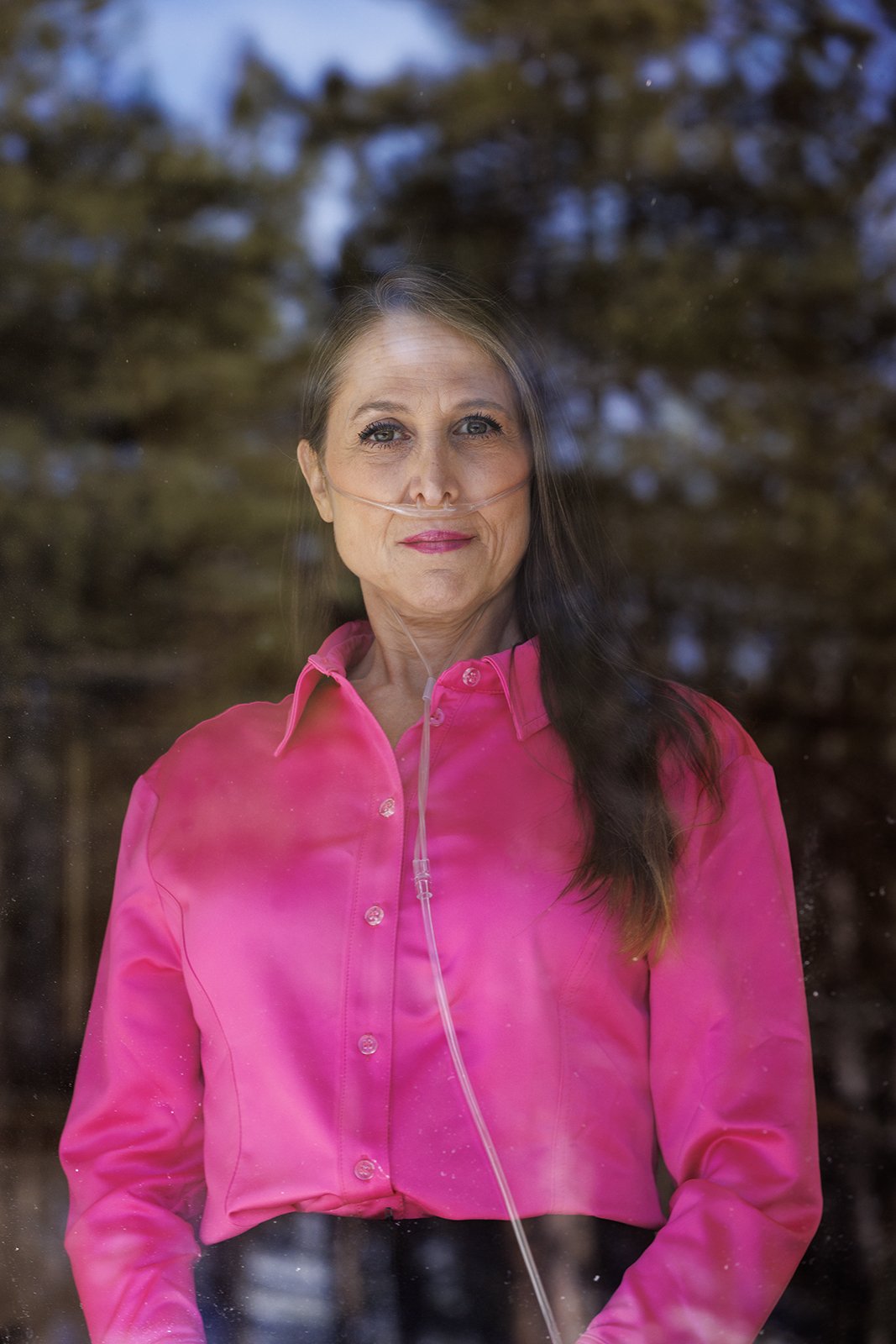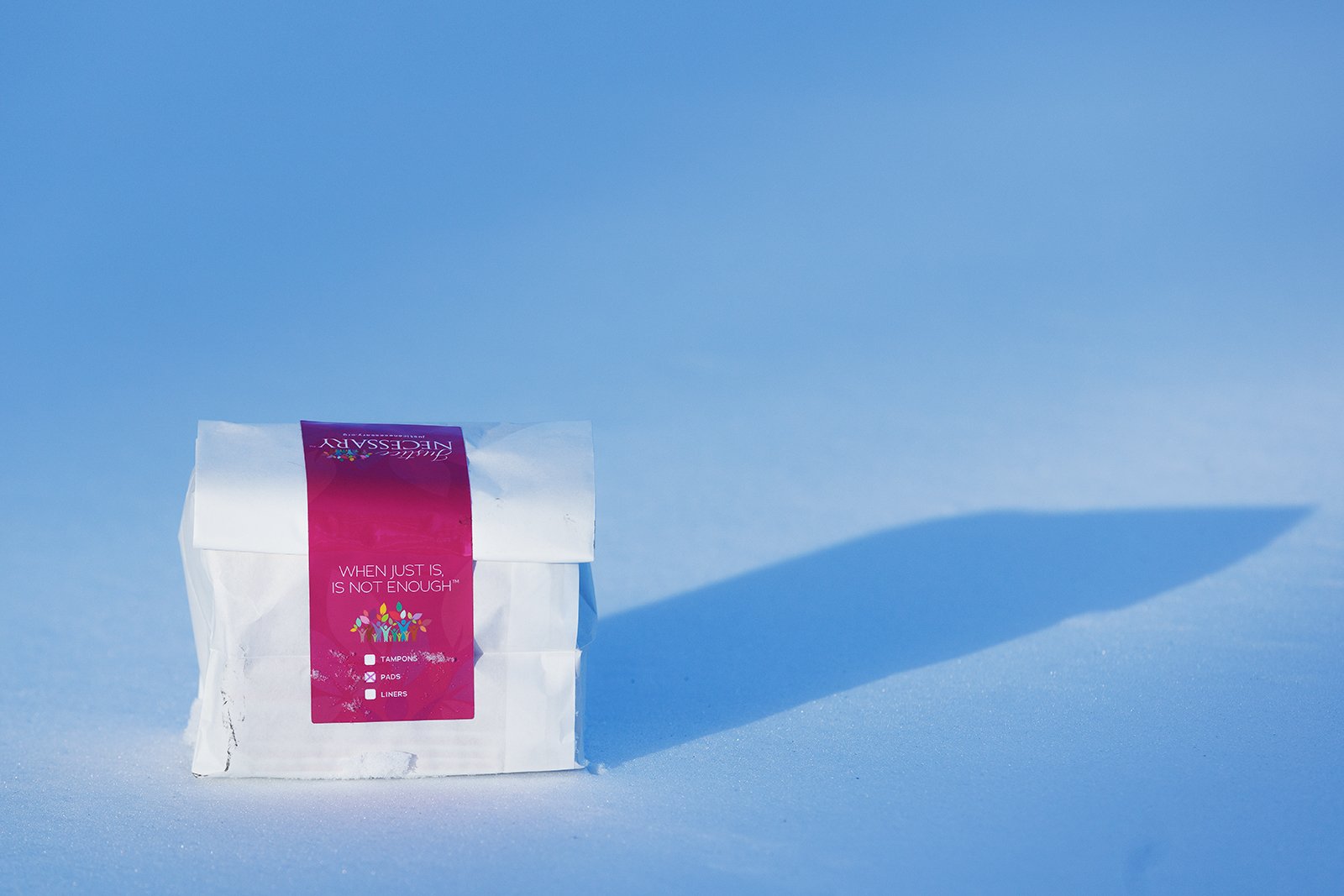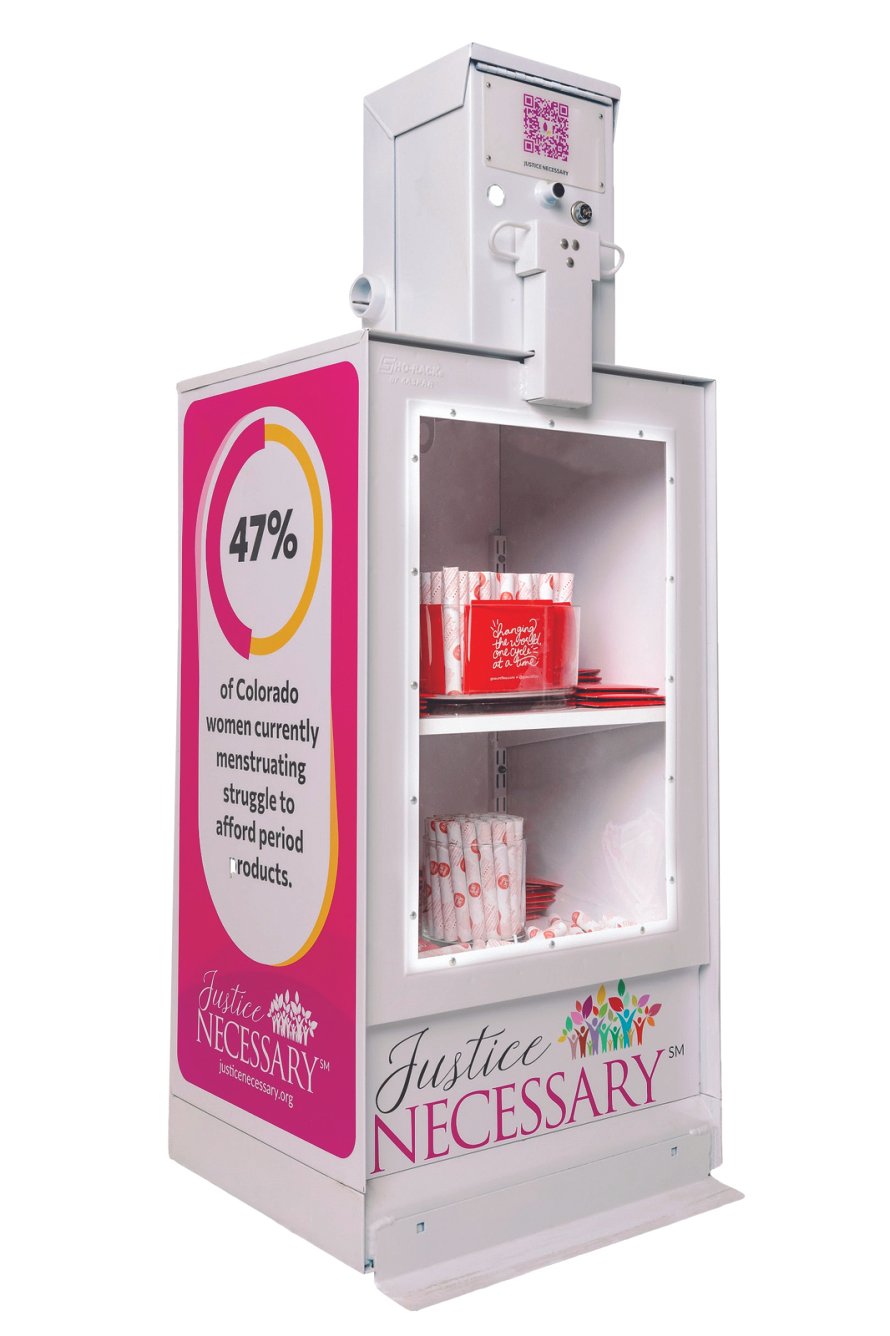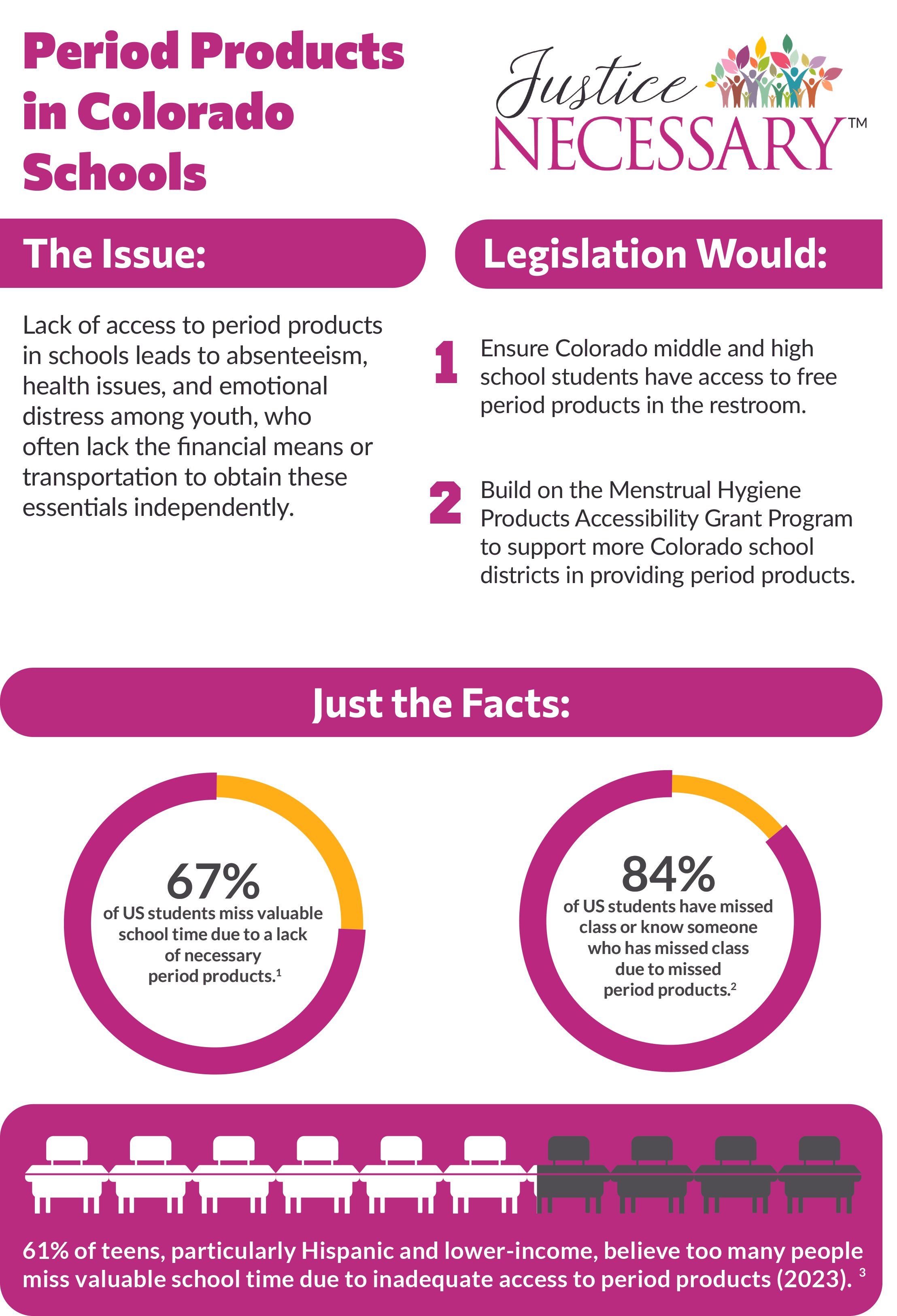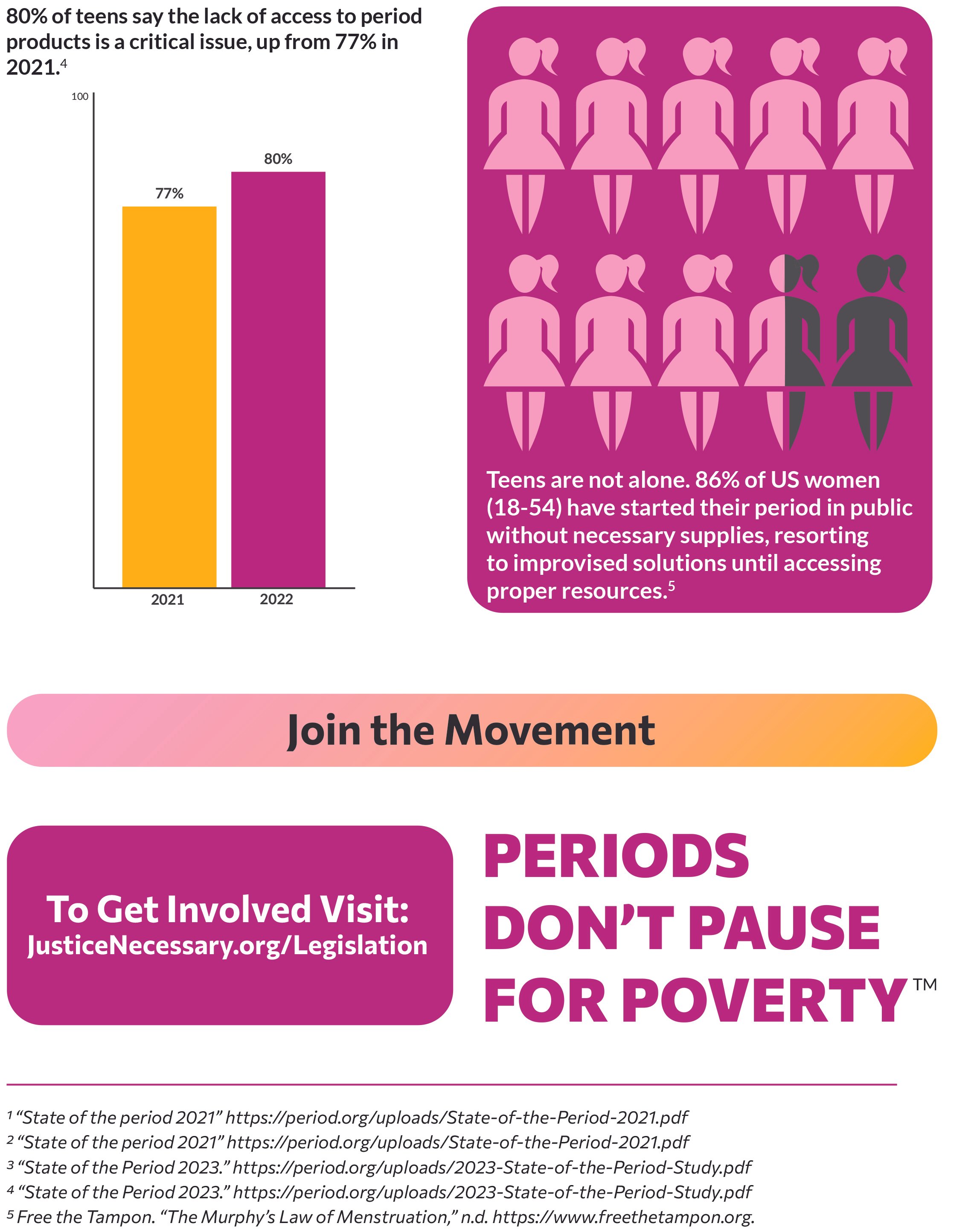Justice Necessary: Addressing period poverty in Colorado
Photo: Giles Clasen
By Grace Thorburn
Diane Cushman Neal was admitted into a Denver hospital with cystic fibrosis and after several weeks, came out of it with the news the condition had damaged her lungs. She would need a double lung transplant to survive. This was in March 2020, just a few days before COVID-19 began sweeping the country.
“The world stopped,” she recalled in an interview with Denver VOICE. “So, I came home and said, ‘How are we going to do this during a respiratory pandemic?’”
Diane Cushman Neal Photo: GIles Clasen
Cushman Neal said that she thought about her situation and realized that instead of worrying, she should put her talents into advocating for positive change and helping others rather than focusing on her problems. With that, she decided to take action.
This is not an unusual approach for Cushman Neal, who said her family describes her as having relentless determination and a knack for generating ideas, which has motivated her to take on various philanthropic projects throughout her life. Cushman Neal’s initial passion for change-making in the community was sparked as a youth when she volunteered at food pantries, and since then, her desire to help others has continued to blossom.
As Denver and other cities locked down during the peak of the pandemic, news stories reported that newly out-of-work families were rushing to food pantries. It occurred to Cushman Neal that if kids weren’t in school, due to the pandemic, it meant they weren’t getting free lunches or breakfasts and families were going hungry.
When Cushman Neal offered to help her local pantry, she learned about an even bigger issue. Not only was lack of food a problem, but as the pantry workers explained, feminine hygiene products were scarce. According to the pantry staff, when a woman came in looking for period products, there was only a small supply of tampons or pads. Cushman Neal said this made her wonder if feminine hygiene was overlooked, how were menstruating girls and women going to cope?
Cushman Neal recognized that when a mother faces challenges accessing period products, that need often extends to difficulties in obtaining diapers for their children. That situation can lead parents to prioritize their children’s needs over their own.
“[I] made this pact in my head that I was going to get [the pantry] a year’s worth of products anonymously and help them get through the pandemic,” Cushman Neal said. “In doing so, I had this epiphany that if someone doesn’t have period products, that also means they don’t have diapers, and they’ll sacrifice period products for diapers.”
This flash-of-lightening inspiration led to a significant change for Cushman Neal. She contacted the Jewish Family Service’s food program and suggested that they host a drive for food and hygiene products. She explained to them that she would help, but she would have to work in isolation, as she couldn’t risk exposure to others due to her cystic fibrosis and delicate lungs.
JFS food program’s annual fall food drive in 2020 was held virtually due to COVID-19. Cushman Neal had been working with an organic, eco-friendly period company. She’d negotiated favorable pricing for the period products, and her goal was to secure a similar pricing arrangement with a diaper company to maximize the funds raised. The drive ran parallel with the JFS annual food drive for 30 days raising the equivalent of 6,000 months of period products and 80,000 diapers.
Pleased with the result, Cushman Neal thanked the pantry staff and suggested they do it again next year. In response, they said, “Oh no, your work is not finished at all, you need to keep going.”
So, she did, and along the way, Justice Necessary was born.
Today, Cushman Neal is building on that success in the wake of external circumstances that continue to force too many into choosing to go without period products and diapers so that they can feed their families.
Photo: Giles Clasen
A report published in 2022 by Justice Necessary found that 47% of Colorado women experience period poverty. Period poverty refers to the struggle women face when trying to afford menstrual products. To address this struggle, Justice Necessary is delivering personal hygiene products to schools, food pantries, and outreach organizations to meet immediate hygiene needs in Colorado communities. A few of their partners include CU Denver, The Salvation Army, Jeffco Public Schools, and the Period Menstrual Movement.
“People aren’t paying attention to this issue [of period poverty],” said Kate Swindell, a team member for the organization PERIOD – a nonprofit working to eradicate period poverty globally. “It’s a think globally, act locally type of movement right now.”
According to Swindell, PERIOD was established through the passion of 16-year-old Nadya Okamata from Portland, Oregon, who gave a name and face to the problem of period poverty. PERIOD, which is made up of 10 women, strives to eradicate period poverty and stigma through advocacy such as their worldwide Period Action Day. Swindell said, “Giving people language and helping people feel comfortable with their bodies and their biological processes” is the most rewarding part of her work with PERIOD. “Getting comfortable with the word [period] and talking about menstruation has been the coolest thing to see. People say it, own it, and use it.” Assistance programs in Colorado, such as Women, Infants, and Children and the Supplemental Nutrition Assistance Program, don’t cover the costs of diapers, baby wipes, or feminine hygiene products. What’s more, the FDA’s decision in February 2023 to cut extra funding to government programs like SNAP, and months of unusually high inflation, have battered many struggling families and reduced their buying power by magnitudes.
“So, when that happened, people in Colorado lost an average of $90 per person [per month] in their household…,” said Cushman Neal. “A family of four that was receiving food benefits through SNAP would lose a total of $360 [per month] in the ability to buy groceries. For a senior receiving $212 [per month] it went down to $23 [per month]. [When] you think about that and then you reflect that back on your grocery bill, hygiene becomes one of the last things.”
According to Cushman Neal, because SNAP and WIC benefits don’t cover hygiene product expenses, food pantries are stretched to their limits, and most are in dire need of hygiene products, specifically feminine hygiene products, diapers, and baby wipes. Cushman Neal said that in just one month, Justice Necessary’s partner agencies experienced a 467% increase in requests for period products.
Photo courtesty of Justice Necessary.org
“If you don’t have to go out without your hygiene products, you quite often don’t put yourself in the shoes of someone who might,” said Wendy Z, who asked that her last name be withheld for privacy. According to Wendy Z, without Justice Necessary’s work to ensure that basic hygiene products are available at food pantries, she would not have been able to get the necessary products she needed. “If everyone had access to period products it would be a miracle,” she said.
Period poverty impacts menstruators physically, medically, emotionally, and socially. In 2022, Justice Necessary surveyed 1,256 Coloradans who identified as female between the ages of 18-40 about their access to period products in the past 12 months and how that impacted their daily lives. Sixty-seven percent of women felt uncomfortable and stressed out when they didn’t have adequate access to period products. Forty-one percent of respondents used period products longer than recommended, and 38% of women missed personal activities due to period poverty.
By using hygiene products longer than recommended, menstruators are at risk for bacterial infections, skin irritations, and a slew of other health problems caused by a lack of access to clean and hygienic products.
Justice Necessary forges connections and educates policymakers about this hidden crisis to build a community where everyone has access to hygiene basics. Thus far, Justice Necessary has donated at least 3.1 million organic period products, 82,216 and counting eco-friendly diapers and wipes, and 190,348 other basic hygiene essentials. The organization also played a key role in advocating for policy change. The collaboration with the HB22-1055 Stakeholder Group to raise awareness about period poverty and diaper needs ultimately led to the removal of the Colorado state sales tax on essential
products such as period products, diapers, and incontinence products. Justice Necessary was also successful in securing an official proclamation from the State of Colorado and Governor Polis for Diaper Need Awareness Week in September 2023.
Currently, Justice Necessary is running legislation in the 2024 legislative session to ensure access to period products for middle and high school students in Colorado.
Affordability, access, and awareness are the three driving factors of the period poverty crisis. According to Cushman Neal, Coloradans who live 20 to 50 miles away from stores that are already on the smaller side may be forced to buy personal hygiene products at a higher price.
Beyond the issue of access to period products and their affordability, Justice Necessary is also committed to people with serious illnesses. Speaking from her experience, Cushman Neal said that individuals with cystic fibrosis are recommended to consume 4,000 calories a day.
“When you think about a family raising a kid with cystic fibrosis needing to buy 4,000 calories of food per day, that’s another reason hygiene gets put on the back burner because you have to make that choice in the checkout line,” Cushman Neal said. “But the reality is if you have a serious illness, hygiene can be the difference, I’m not being overdramatic but literally, it is life and death, because when you are immunosuppressed or struggling with the difference of an infection is the difference of if you are going in the hospital or if you’re going to be able to continue to live a normal life.”
Justice Necessary’s commitment to a cleaner environment has allowed the organization to address two pressing societal issues simultaneously: protecting the planet and providing feminine hygiene products that are free of harmful chemicals. Cushman Neal pointed out that a common misconception is people automatically assume eco-friendly products that are good for our bodies and the environment are expensive and are not within reach. Period products that contain formaldehyde and known carcinogens easily transit these chemicals into the bodies of menstruators.
“Medically we’ve been able to create vaginal creams that allow medication to be delivered through that method as they go very easily into the bloodstream,” said Cushman Neal.
“When you think about how easy it is on a medical level and then formaldehyde [a harmful, potentially cancer-causing chemical which is found in many menstrual products] goes into or on a menstruator’s body, you think about what does that do long term?” said Cushman Neal.
Cushman Neal said that by providing the community with hygiene products that are free of harmful chemicals and environmentally responsible, they’re avoiding boomeranging these women back into a system where they will need medical help in the long term due to these harmful chemicals entering their bodies.
For someone with a motto of “dream it, plan it, do it,” connecting with nearly 1,000 pantries and organizations in Colorado that provide personal hygiene products to menstruators in the Colorado community is just the starting point of Cushman Neal’s work.
Justice Necessary will soon launch “Find Your Pantry,” a program to help community members find their nearest pantry for food, period products, hygiene products, and more.
“By doing this, it allows us to tell people in Colorado where to go so that you don’t have somebody traveling across town with their children to find out they can’t get diapers, they can’t get period products,” said Cushman Neal. “There’s so many people that are so generous that can work on a community level to support each other.”
At the heart of Cushman Neal’s work at Justice Necessary is helping the next person in need, month after month, by increasing outreach to connect with further organizations and food pantries to ideally fulfill the needs of all 64 counties in Colorado.
According to Cushman Neal, when someone calls to express how access to personal hygiene products has enabled them to resume their daily routines – like going to work, spending time with their families, or going to school – she knows Justice Necessary is making a difference. She also knows her work has just begun. “What’s hard for me, honestly, is I then worry that we’ve only done this amount, but I want to do more.”


